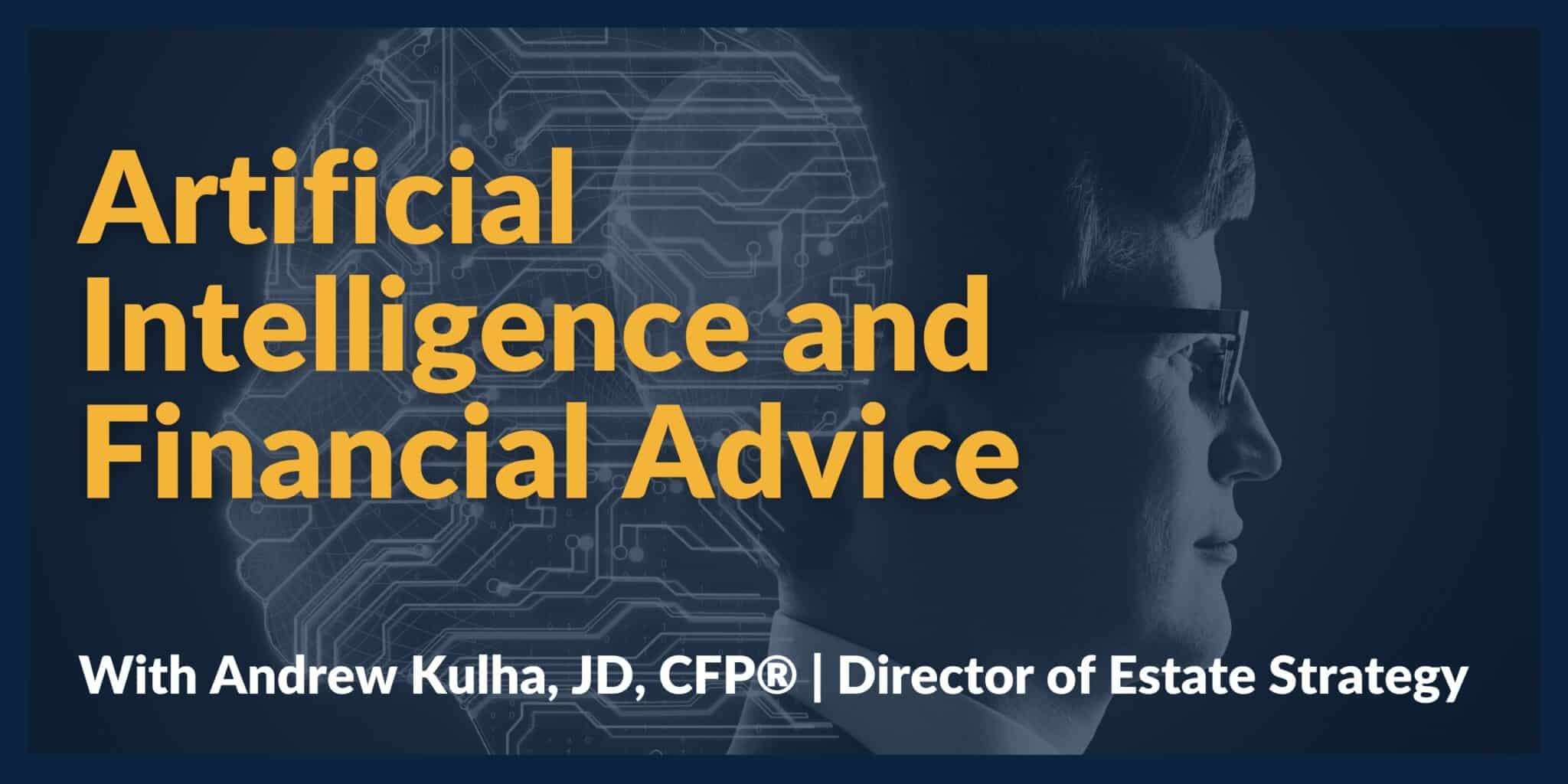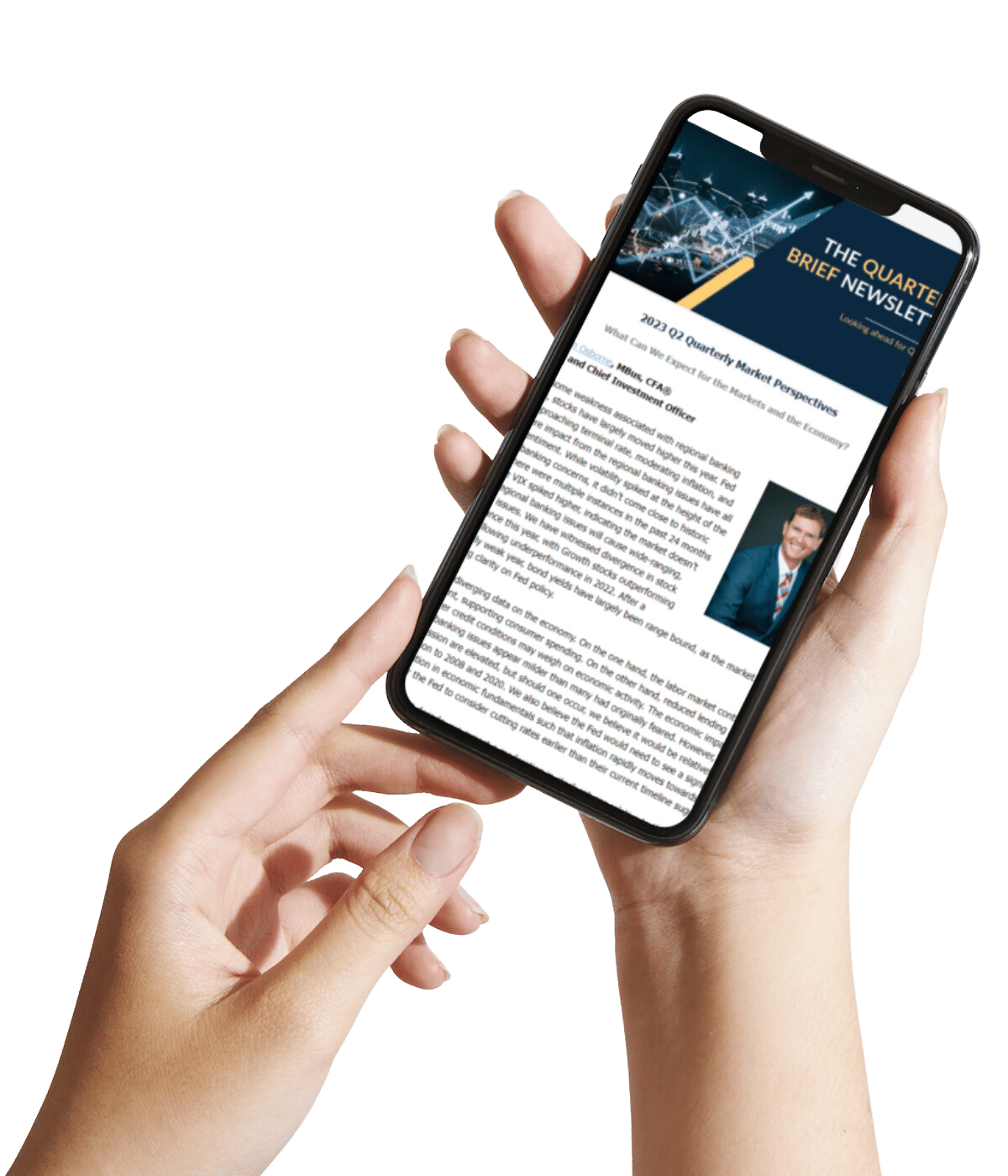Will Artificial Intelligence and ChatGPT Replace the Value of Advisors?

There’s been plenty of ink spilled about how artificial intelligence (AI) is going to take over every industry and replace the value of humans in advisory relationships. There’s no doubt that AI is a highly effective tool to leverage and to help augment your skillset. However, despite its many advantages, AI is unlikely to completely replace the human element in financial advising roles.
Concerns with AI’s Role in Financial Planning
- One of the primary concerns people have with AI is the lack of emotional intelligence and empathy that is essential in financial and estate planning. While AI can analyze data and provide objective advice based on algorithms, it lacks the ability to understand and respond to the emotions of its clients. For example, a grieving family may require more than just a basic estate plan, and an AI model cannot provide the support and comfort that a human advisor can.
- Additionally, financial and estate planning involves complex decisions that require careful consideration and personalization. AI may be able to provide general advice based on data and past experiences, but it cannot fully understand the unique circumstances of each client’s situation. Human advisors can consider a client’s personal values, goals, and priorities, and tailor their advice accordingly.
- Another concern with AI is the potential for bias in its algorithms. While AI is designed to be objective and data-driven, the algorithms it uses are only as unbiased as the data they are based on. If the data sets used to train AI contain inherent biases, such as gender or racial biases, this could lead to biased advice being given to clients.
- Furthermore, many people value the personal relationships they have with their financial advisors and estate planners. Human advisors can provide emotional support and guidance throughout the planning process, which is something AI cannot replicate. For example, a client may appreciate the ability to speak with their advisor in person or over the phone rather than relying solely on digital communication.
- Finally, and likely most importantly, there are limits to an AI’s knowledge base. Most AI models at present are language models, meaning they do not have a numerical computation engine built into their programming. Because they are simply language models, they do not have the capability to store and manipulate numerical data like a standard computer program does. The model is able to generate fairly human-like text based on patterns and examples it has previously learned and observed from the data that was initially entered into its system, which is why an AI like ChatGPT may be able to understand 2+2=4. This is a fairly common and understood expression, but AI can’t replicate the same results when given more complex variables.
As an example, I recently worked on a few higher-level Trust calculations. Over three prompts of the same question with the same variables, answers came back that varied from $800,000 to $3 million – a swing of almost $4 million! At other times, the formulas being used to calculate the response to my prompts changed halfway through the process with no explanation as to why they were changed.
There are further limits on many AI’s knowledge bases, as well. Many AIs have knowledge bases that stop at a certain date, which could lead to inaccurate results for tax and estate planning purposes. For example, the 2023 Lifetime Unified Credit Exemption is $12,920,000 per person, but ChatGPT answered $5,000,000 – off by almost $8,000,000 and almost $3.2M more in taxes that might be owed! A similar basic question about any updates to estate planning laws in 2023 returned a few answers, but upon further research each change had taken place several years prior, questioning how often the models’ data is updated.
A Financial Advisor’s Best Asset is Emotion
While AI has many benefits as a financial and estate planning tool, it is unlikely to fully replace the human element in these roles. Emotional intelligence, personalization, bias prevention, being able to trust underlying data calculations, and staying up to date on changes in the law are all important aspects of financial and estate planning that AI cannot fully provide. As technology continues to advance, it is important to recognize the limitations and strengths of both human advisors and AI to determine the best approach for each individual’s unique situation.
For many individuals, money and finances can evoke strong emotions, and it may be challenging to make rational decisions during periods of financial stress or uncertainty. A human financial advisor can provide both emotional support and guidance to help navigate these difficult times, ensuring that you stay on course and make sound decisions when you’re feeling overwhelmed or uncertain about your financial situation.
Financial Guidance For Your Life Journey
Talk with a financial planner about your next steps.Guidance For Your Full Financial Journey
Through our comprehensive platform and expertise, Mission Wealth can guide you through all of life's events, including retirement, investment planning, family planning, and more. You will face many financial decisions. Let us guide you through your options and create a plan.
Mission Wealth’s vision is to provide caring advice that empowers families to achieve their life dreams. Our founders were pioneers in the industry when they embraced the client-first principles of objective advice, comprehensive financial planning, coordination with other professional advisors, and proactive service. We are fiduciaries, and our holistic planning process provides clarity and confidence. For more information on Mission Wealth, please visit missionwealth.com.
To schedule a meeting with a Mission Wealth financial advisor, contact us today at (805) 882-2360.
Mission Wealth is a Registered Investment Advisor. This commentary reflects the personal opinions, viewpoints, and analyses of the Mission Wealth employees providing such comments. It should not be regarded as a description of advisory services provided by Mission Wealth or performance returns of any Mission Wealth client. The views reflected in the commentary are subject to change at any time without notice. Nothing in this commentary constitutes investment advice, performance data, or any recommendation that any particular security, portfolio of securities, transaction, or investment strategy is suitable for any specific person. Any mention of a particular security and related performance data is not a recommendation to buy or sell that security. Mission Wealth manages its clients’ accounts using a variety of investment techniques and strategies, which are not necessarily discussed in the commentary. Investments in securities involve the risk of loss. Past performance is no guarantee of future results.
Let's Keep in Touch!
Subscribe for exclusive content and timely tips to empower you on your financial journey. Our communications go straight into your inbox, so you'll never miss out on expert advice that can positively impact your life.Recent Insights Articles

Mission Wealth Announces Strategic Merger with Austin’s PBL Wealth Management
January 27, 2026
Managing Capital Gains: How Thoughtful Planning Can Help You Keep More of What You Earn
January 26, 2026


